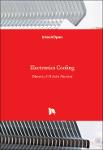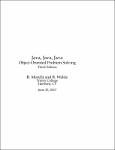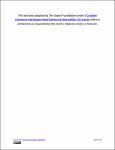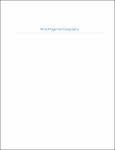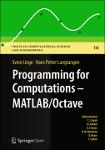Search
Author
- McFadyen, Ron (3)
- A Carpenter, Mason (1)
- Alisher, Mirzabaev (1)
- Caitlin, Finlayson (1)
- next >
Subject
- Java (5)
- programming (4)
- kinh tế (3)
- BlueJ (2)
- next >
Has File(s)
- true (24)
Search Results
Featuring contributions from the renowned researchers and academicians in the field, this book covers key conventional and emerging cooling techniques and coolants for electronics cooling. It includes following thematic topics: - Cooling approaches and coolants - Boiling and phase change-based technologies - Heat pipes-based cooling - Microchannels cooling systems - Heat loop cooling technology - Nanofluids as coolants - Theoretical development for the junction temperature of package chips. This book is intended to be a reference source and guide to researchers, engineers, postgraduate students, and academicians in the fields of thermal management and cooling technologies as well as for people in the electronics and semiconductors industries. |
This book introduces a novel approach to the design and operation of large ICT systems. It views the technical solutions and their stakeholders as complex adaptive systems and argues that traditional risk analyses cannot predict all future incidents with major impacts. To avoid unacceptable events, it is necessary to establish and operate anti-fragile ICT systems that limit the impact of all incidents, and which learn from small-impact incidents how to function increasingly well in changing environments.
The book applies four design principles and one operational principle to achieve anti-fragility for different classes of incidents. It discusses how systems can achieve high availability, prevent malware epidemics, and detect anomalies. Analyses of Netflix’s media streaming solut... |
"We have designed this third edition of Java, Java, Java to be suitable for a typical Introduction to Computer Science (CS1) course or for a slightly more advanced Java as a Second Language course. This edition retains the “objects first” approach to programming and problem solving that was characteristic of the first two editions. Throughout the text we emphasize careful coverage of Java language features, introductory programming concepts, and object-oriented design principles.
The third edition retains many of the features of the first two editions, including:
Early Introduction of Objects
Emphasis on Object Oriented Design (OOD)
Unified Modeling Language (UML) Diagrams
Self-study Exercises with Answers
Programming, Debugging, and Design Tips.
From the Java Library Sec... |
This volume deals with land degradation, which is occurring in almost all terrestrial biomes and agro-ecologies, in both low and high income countries and is stretching to about 30% of the total global land area. About three billion people reside in these degraded lands. However, the impact of land degradation is especially severe on livelihoods of the poor who heavily depend on natural resources. The annual global cost of land degradation due to land use and cover change (LUCC) and lower cropland and rangeland productivity is estimated to be about 300 billion USD. Sub-Saharan Africa (SSA) accounts for the largest share (22%) of the total global cost of land degradation. Only about 38% of the cost of land degradation due to LUCC - which accounts for 78% of the US$300 billion loss - ... |
Immigrant and Refugee Families: Global Perspectives on Displacement and Resettlement Experiences offers an interdisciplinary perspective on immigrant and refugee families' challenges and resilience across multiple domains, including economic, political, health, and human rights. This new edition has been revised and updated from the original 2016 edition. |
Carpenter and Dunung's International Business: The Opportunities and Challenges of a Flat World provides exploration into building, leading, and thriving in global organizations in an increasingly flat world. The authors define ”Flat world“ as one where service industries that dwarf manufacturing industries in terms of scale and scope, an Internet that pervades life and work, and networks define modern businesses, whether service or manufacturing. Carpenter and Dunung's text is designed to speak to technologically-savvy students who see national borders as bridges and not barriers. |
Anything that can be automated, will be. The “magic” that digital technology has brought us — self-driving cars, Bitcoin, high frequency trading, internet of things, social networking, mass surveillance, the 2009 housing bubble — has not been considered ideologically. The Critique of Digital Capitalism identifies how digital technology has captured contemporary society in a reification of capitalist priorities. The theory proposed in this book is the description of how digital capitalism as an ideologically “invisible” framework is realized in technology. Written as a series of articles between 2003 and 2015, it provides a broad critical scope for understanding the inherent demands of capitalist protocols for expansion without constraint (regardless of social, legal or ethical limit... |
Rather than present students with a broad, novice-level introduction to geography, emphasizing places and vocabulary terms, this text approaches geography as experts understand the discipline, focusing on connections and an in-depth understanding of core themes. This thematic approach, informed by pedagogical research, provides students with an introduction to thinking geographically. Instead of repeating the same several themes each chapter, this text emphasizes depth over breadth by arranging each chapter around a central theme and then exploring that theme in detail as it applies to the particular region. In addition, while chapters are designed to stand alone and be rearranged or eliminated at the instructor's discretion, the theme of globalization and inequality unites all of t... |
Knowing Home attempts to capture the creative vision of Indigenous scientific knowledge and technology that is derived from an ecology of a home place. The traditional wisdom component of Indigenous Science—the values and ways of decision-making—assists humans in their relationship with each other, the land and water, and all of creation. Indigenous perspectives have the potential to give insight and guidance to the kind of environmental ethics and deep understanding that we must gain as we attempt to solve the increasingly complex problems of the 21st century. |
This book presents computer programming as a key method for solving mathematical problems. There are two versions of the book, one for MATLAB and one for Python. The book was inspired by the Springer book TCSE 6: A Primer on Scientific Programming with Python (by Langtangen), but the style is more accessible and concise, in keeping with the needs of engineering students. The book outlines the shortest possible path from no previous experience with programming to a set of skills that allows the students to write simple programs for solving common mathematical problems with numerical methods in engineering and science courses. The emphasis is on generic algorithms, clean design of programs, use of functions, and automatic tests for verification. |

